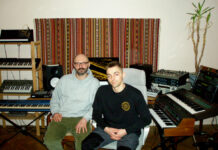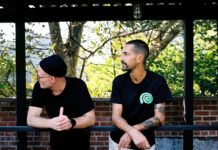Foto: Grey Putnam (Noncompliant/DJ Shiva)
There’s people who are passionate about Techno and there’s people like Lisa Smith, who seem to practically breathe Techno. Smith has been part of the Midwest rave scene for two decades now and has become internationally known under her DJ Shiva moniker in the past years, but has also recently debuted with a new pseudonym, the hardware-orientated Noncompliant Her recent releases under the new name on Detroit Underground and Ambivalent’s Valence imprint showcase a brand of belting, hyperprecise Techno with a funky twist that also dominates her contribution to our Groove podcast. It’s all peaks and valleys – but Techno through and through.
Before turning to Techno, you have played guitar in Punk bands. What drew you to electronic music and how did you experience the Midwest rave scene at that point?
I can trace the path to techno from 80s music to punk rock to industrial to crazy rave music and UK hardcore to techno. Techno drew me because I liked the aggressive, non-organic sounds reminiscent of industrial, with no vocals and more funk. We built our own little “rave” thing in my hometown of Evansville, Indiana, pretty disconnected from what any of it really was. We just had a basic concept and ran with it. This was 1992-93ish. Our scene was so small that everyone was a part of it: punks, skaters, goths, ravers, and freaks of all kinds. I started DJing with just CD players. No beatmatching, no real idea of what was happening anywhere else. So a typical night could be anything from Opus III to Moby to The Prodigy to Siouxsie and the Banshees to Dead Can Dance, depending on my mood. I remember Apotheosis “O Fortuna” was a crowd favorite back then. I finally found some flyers for raves in other cities and started driving other places and that’s when I saw people using turntables and decided to try that. I’ve never been much of a spectator. But we grew up so isolated from what was going on elsewhere that we always had a slightly different take on things, and I am glad for that. After that I moved to Indianapolis and it was just road trips and parties anywhere: bingo halls, barns, warehouses, abandoned office buildings… anywhere. Hauling my records in a backpack so I could jet quickly if things got busted. And they did, frequently. But we persisted.
While a lot of DJs and producers have expressed their disappointment with the local scene and moved away from the Midwest or relocated to Detroit and especially Chicago, you still live in Indiana. How do you perceive the scene nowadays?
Well, it’s not that I want to stay here. It’s just that it’s affordable and I have a pretty cool job at the moment. The will to move is definitely there, just not the means. Indiana has no real scene anymore. There are a few people doing their best, but as far as techno goes it’s an uphill battle and most of us are old enough that we have other responsibilities that make losing our ass throwing parties a bad idea. That makes it easier to spend my weekends home in the studio, though. I filled a room with synths and never looked back.
Around a decade ago, you started releasing your own music. However, you have gone on record to say that you initially had not wanted to do so. A dozen of releases and a slew of remixes later, how do you feel about this now?
I have always felt this pressure “to produce music to get DJ gigs” is a strange idea that places more emphasis on disposable music as a business card, rather than an end unto itself. Not to mention that being good at one doesn’t mean you are necessarily good at the other. It often means a lot of shitty music from great DJs and a lot of shitty DJing from great producers. I thought it was ridiculous being pushed to make music when I didn’t feel like I had anything to say that way. I will paraphrase DVS1 here: DJing is the language in which I am most fluent. I have made music my entire life though, and it was probably inevitable that I would end up doing it anyway. And as I got more skilled with the tools, I found that my earlier frustrations were mostly technical and therefore more indicative of a lack of confidence. Once I stopped beating myself up about that and just focused on having fun and making things I liked, my perspective changed a lot. It can still sometimes be like pulling teeth to make something I feel is worth releasing, though. As Dorothy Parker said, “I hate writing. I love having written.”
You have recently released new material under both the DJ Shiva and your Noncompliant monikers. Musically speaking, what is the difference between those two projects?
As DJ Shiva, it was just me making banging tunes to DJ with. There were ideas there, but they were usually just personal stuff. All of that was done “in-the-box” on software and controllers. A couple years ago I was happily dragged into the world of hardware and the change in approach changed the sound as well as my perspective on production as a whole. That hardware approach, combined with the need to do something different after 20 years, was the inception of Noncompliant. It started as a more anonymous project, as well. I had, shall we say, ruffled some feathers with my directness about sexism and other matters, so I conceived of it as sliding some new music in under-the-radar, detached from that reputation, but still doing so with an explicitly feminist angle. Kind of an under-the-breath “fuck you”, really. I quickly realized that I didn’t care to hide it and just leaned right into being even more outspoken and direct about the intent of it. Noncompliant is pulled from a feminist comic book called Bitch Planet, where “noncompliant” women are put on a prison planet for the crime of not conforming or being submissive and silent. Seemed apropos. The titles are generally references to feminist literature or quotes or concepts, or in the case of the upcoming She/Her EP on Flash Recordings, the tunes are all named after some of my favorite fictional TV queer ladies.
The name Noncompliant can also be understood as a statement and indeed you usually don’t mince words when it comes to political topics. Would you say that DJs and producers should use their platforms to engage their audience in political discussions and if so?
I grew up on political punk rock, so it’s kind of woven into how I experience music. My day job is working for an advocacy organization. I’m an activist and an artist and those two things are inseparable for me. For me, art should try to say something and/or be confrontational. Women are often expected to be submissive, to be quiet. That’s…not gonna happen with me. And there will always be those who will try to tear you down if you take that route, find your soft spots, your hypocrisies. We all have them. I am not under any illusions that I am perfect. I’m just trying to learn every day and be a better person and make the world a little less shitty. Music makes my world less shitty. Hoping I can do the same for others. But I also think that no one gets to tell anyone else how to make art or how to feel. So if you want to use your platform to engage in political/social discussions, I think you should. That doesn’t mean you have to. And for some folks, especially marginalized folks like women, queer and trans folks, people of color, immigrants, just living in this world and being who we are is a political act (and not because we want it to be), so who am I to tell people they have to bring that into their art, too? Sometimes art and music can and should be a place to escape the world and find some momentary solace. Beauty and joy can be its own form of resistance.
In the book Unlocking the Groove, you are being quoted saying that composition and proper phrasing are key competences of a DJ. What exactly does that mean?
The phrasing part is about understanding measures and timing. Part of doing that is knowing your counts – as a DJ, 4, 8, 16, 32, and 64 are numbers that become instinctual – and knowing how the tunes are composed and how they rise and fall and where they mesh and where they might clash. Knowing about dropping on “the one” is pretty critical, although there are sometimes exceptions. Do it well and things sound locked in, like they are supposed to play together that way. People who just drop things willy nilly at any beat in the measure with no regard for structure or sound make me a little crazy. Sometimes it can work, but mostly it just sounds fucking messy to me. Composition refers what I just said about knowing the basic composition of the songs themselves, but also regarding a DJ set as itself a long-form musical piece. I think of DJ sets like a piece of classical music or improv jazz, where you may have something that goes on for an hour or more, but with individual movements within. There is a rise and a fall. There is never just a linear sound, but movement within the larger piece and a sense of change and evolution. Basically, I get super bored with linear techno sets with little variation. Make it move. Make it evolve over the course of a set. You can bang it out and still have those peaks and valleys that keep it interesting.
Your contribution to our Groove podcast comprises mostly new material. You have said that you were a “nerd for making mixes”. How did you approach this one?
With studio mixes, I always do a first run through where I just start playing to see where things go and what tunes I draw for. I never really think “play all new stuff” or whatever. Those are just the songs that told me they were supposed to be there. As I feel what direction it wants to take, I start thinking about maybe some specific songs I want in there or how I want it to flow. Does it start mellow and build? Does it want to bang first and chill later? Once I figure out the arc of the mix, I might rearrange or change tunes for better flow or for a specific feeling I want to imbue in the listener. Once I figure all that out, it gets mixed live and HOPEFULLY everything works out in that first recording. This one was a one-take mix once I knew the plot of it.
Last but not least: Where can we see you behind the decks in the near future and what are your plans for the rest of the year and beyond?
I am very excited to be making my first appearance at Berlin’s Panorama Bar on April 16 for Oster Klubnacht. I will also be playing the infamous Club Toilet afterparty on May 27 during Movement Detroit. Looking forward to the aforementioned She/Her EP on Flash Recordings coming out on May 5. Main plans are just to make more music, get more deeply acquainted with my gear so I can better translate what’s in my head into the music, and hopefully get to DJ in some new places I have never been before. Also, work with more women in music and dance on the smouldering ashes of the Trump/Pence administration.
Stream: Noncompliant – Groove Podcast 102
01. Dubspeeka – She Loves (16edit) [Skeleton]
02. San Proper, Antal – Sweet Nightmare [Indigo Aera]
03. Redshape – London [Delsin]
04. Hans Berg – Bubbel Trubbel (Silvershower Remix) [Montage]
05. Fabrice Lig – Miss-Tic [Lig Music]
06. Tessela – Rub [Blueprint]
07. DJ Shiva – Pride Before [Different Is Different]
08. Trust The Machine – Tatsumaki [Bass Agenda]
09. Rolando – Time To Jack (Marcel Dettmann Remix 1) [R3 Roland Rocha Records]
10. Noncompliant – More Than Surviving (Ambivalent Remix) [Valence]
11. TWR72 – Speech [TWR72]
12. Developer – Hooked In [Developer Archive]
13. Zach Lubin – Dispense With Tactics [Obvio]
14. Moerbeck – Where The Wild Things Are [Code Is Law]
15. Abstract Division – Deformation (Norman Nodge Remix) [Dynamic Reflection]
16. L/F/D/M – Heavy Clouds [CGI]
17. Akilah Bryant – Eye Trip [DJax Up Beats]
18. Aiden Tyrell – GETO5 [Clone Jack For Daze]
19. Noncompliant – Alexandra [Flash]





